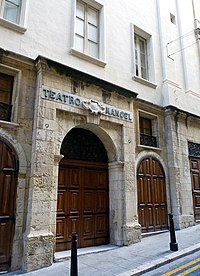Manoel Theatre
| Teatro Pubblico (1732-1800) Teatro Reale (1800-1873) |
|

Façade of the Manoel Theatre
|
|
| Address | 115, Old Theatre Street Valletta Malta |
|---|---|
| Designation | Grade 1 listed building |
| Capacity | 623 |
| Opened | 1732 |
| Years active | 1732-present |
| Website | |
| http://www.teatrumanoel.com.mt/ | |
The Manoel Theatre (Maltese: It-Teatru Manoel) is a theatre and important performing arts venue in Malta. The theatre is often referred to as simply "The Manoel", and is named after Grand Master of the Order of the Knights Hospitaller, Fra António Manoel de Vilhena, who ordered its construction in 1731. The theatre is reputed to be Europe's third-oldest working theatre (older than the San Carlo in Naples), and the oldest theatre still in operation in the Commonwealth of Nations.
The theatre is located on Old Theatre Street (Maltese: Triq it-Teatru l-Antik) in Valletta. It considers itself as the country's national theatre and the home of Malta Philharmonic Orchestra (Maltese: Orkestra Filarmonika Nazzjonali). Originally called the Teatro Pubblico, its name was changed to Teatro Reale, or Theatre Royal, in 1812, and renamed Manoel Theatre in 1866. The first play to be performed was Maffei's Merope. The theatre is a small, 623 seat venue, with an oval-shaped auditorium, three tiers of boxes constructed entirely of wood, decorated with gold leaf, and a pale blue trompe-l'oeil ceiling that resembles a round cupola. The building is a Grade 1 listed building as noted by Malta's Superintendence of Cultural Heritage, and is also scheduled by the Malta Environment and Planning Authority (MEPA).
Before the construction of the theatre, plays and amateur theatrical productions were staged in the halls and piano nobiles of the Knights' auberges. These were palaces constructed for the langues of the Order. The Langue of Italy often held such entertainment, staged by its knights in their Auberge. The records of the Langue even state that on February 2, 1697, some Maltese gentlemen presented a play in the Auberge d'Italie. Women were prohibited from attending these events after incidents during the Carnival festivities of 1639.
...
Wikipedia
